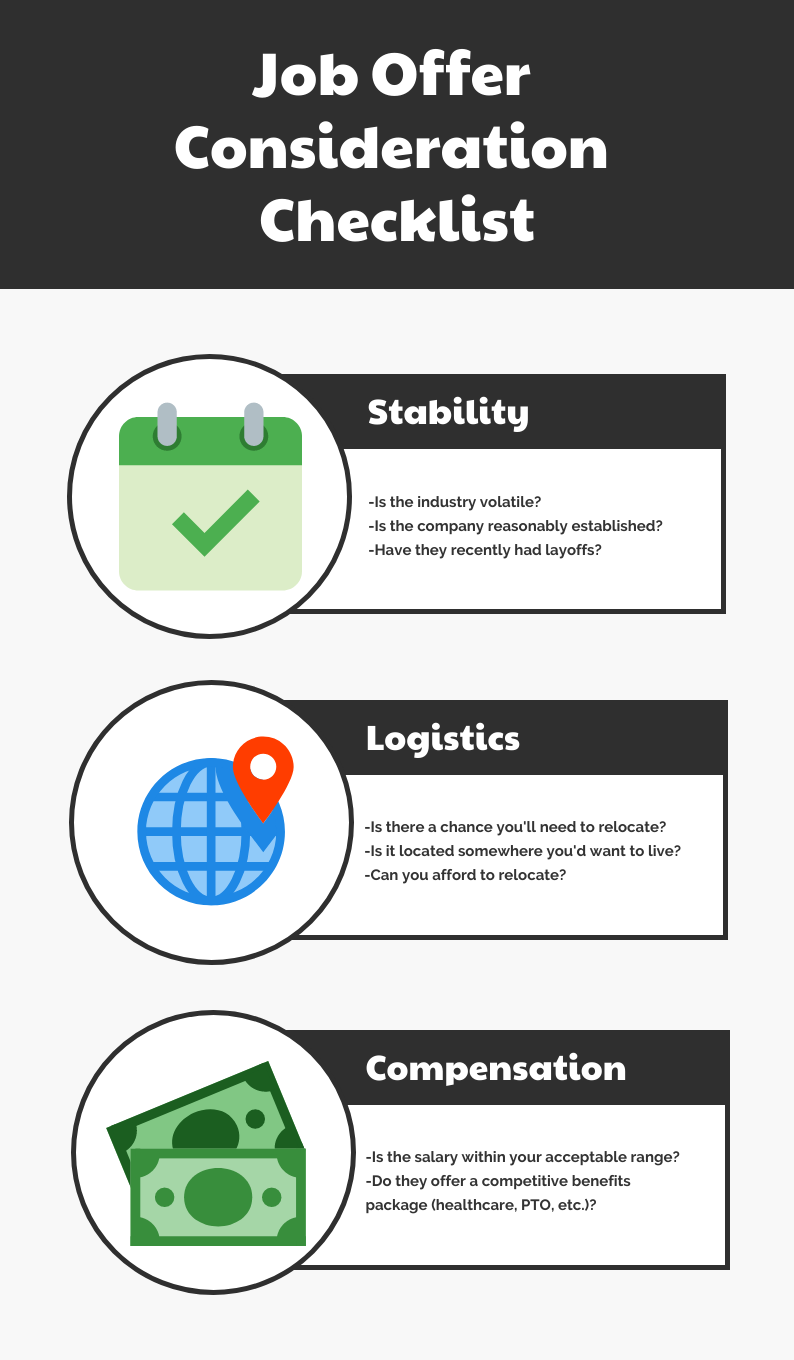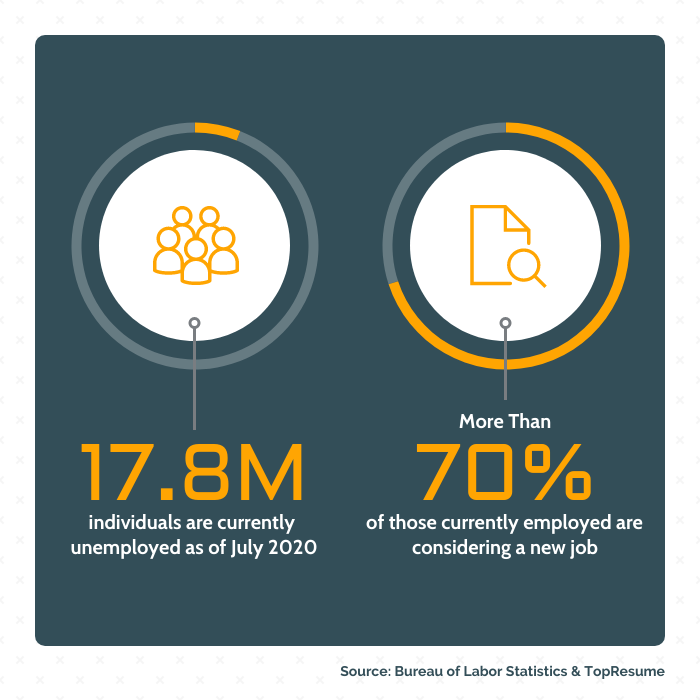Our Blog
3 Things to Consider When Accepting a Job Offer During COVID
Whether you’re trying to land your first full-time job or have recently been laid off and need to replace your income quickly, finding the right job during the coronavirus pandemic can be more difficult than ever. According to a July 2020 report from the Bureau of Labor Statistics, nearly 18 million individuals are unemployed in the U.S. Additionally, more than 70% of people who are currently employed are considering a new job.
With these staggering unemployment numbers—plus the competition you’re facing against employed job seekers—securing an interview, let alone securing a job offer, is a major achievement. However, that doesn’t necessarily mean you should automatically say yes to the opportunity before you.
Any job offer that you receive should be carefully weighed to ensure that it’s the right fit for you. To help ensure you make the best decision, here are a few things you should consider when accepting a job offer during COVID:
#1: Economic Risks & Job Stability
While some companies are still hiring through coronavirus, that does not necessarily mean that they are stable enough to withstand another hit to the economy should there be another major wave of COVID-19—which is predicted to occur during the fall or winter. Even with the most careful planning and forecasting, a worsening recession or drastic economic change affecting certain industries can take companies by surprise. And, as we’ve seen this year, one of the first things to go when companies need to cut costs is employees.
Before you accept a job offer, make sure you properly vet the company and try to put some job security measures in place. Here are some questions you should ask yourself when considering whether a job is considerably low-risk:
- Is this industry one that is more vulnerable to discretionary spending habits? (This applies to many industries including tourism, transportation, and entertainment.)
- Did the company recently lay off a large portion of their staff? (You may be able to ask this flat out or find the information online.)
- How long has the company been in operation? (The longer the company has been established, the more stable they may be—especially if they’ve already survived the Great Recession of 2008.)
- How many long-term employees do they have on staff? (Many companies are happy to share this information during an interview or you might find it on their website or social media.)
#2: Logistics
For many people, the switch to work from home for many workplaces is a dream. While some plan to keep things that way, other companies are eager to get back to the office. When you’re considering a job offer, you will want to consider what your new work environment will mean to you.
If they are currently working remotely and planning to stay that way, is that your preference? Or do you dislike being secluded? If they are planning to eventually return to their office space as soon as possible, will that affect you? This is especially important to consider if you’re applying for a job outside of your state or desired commute range.
If you are going to have to relocate, there are special considerations to keep in mind as far as costs, inconvenience, and lifestyle go. You should ask yourself the following questions if you might have to relocate for your this job:
- Are you willing to live in the city where the job is located? (Check things like cost of living, transportation options, etc.)
- Can you afford your preferred living arrangement? (Don’t forget to ask the right questions when it comes time to view an apartment.)
- Is this a job that you could see yourself staying at for at least a few years? (Moving is expensive, so it might not be worth the hassle if this isn’t a job you’re going to stick with.)
Even if you’ve received an offer for your dream job, location can be a deal breaker, so make sure you don’t jump into such a big commitment before carefully considering the benefits and drawbacks, you’ll be thankful you did in the long run.
#3: Compensation
Breaking down the actual compensation is also an important aspect of considering any job offer. When it comes to compensation, there are two main components to evaluate:
- Salary: Money makes the world go ‘round, so you want to make sure that your salary meets your needs and then some. Before you started job hunting, you should have set a minimum salary that you would be willing to accept, but it’s always important to aim higher. This way, you can ensure you get an offer for as much as possible, and ideally, are able to improve upon your lifestyle.
- Benefits & Perks: It’s not all about salary. In fact, the value of benefits like health insurance, 401(k) matching, PTO, and more can actually far exceed the dollar amount difference between two job offers. Other perks like work-from-home days, catered meals, and reimbursement for courses, should also be considered when it comes to weighing your options.
If these factors aren’t quite up to par, but aren’t completely out of the range of what you’re willing to accept, try to negotiate with the company. In many cases, employers have some wiggle room where they may be willing to work with you, especially if they’re eager to fill the position.
Making Your Decision
Receiving a job offer is an exciting opportunity to grow in your career, but taking a new job requires careful consideration, especially during these uncertain times. Turning down a job offer when so many people are out of work and desperately looking for ways to support themselves, it might seem unwise to consider turning down a job offer. However, if the job is not a good fit or isn’t going to offer you the stability you need, it could end up being more hassle than it’s worth if you currently have reliable employment. If you’re unsure of what you want to do, don’t be afraid to ask for a little more time to make your decision.
Author Bio
Alexis Maness has a Bachelor of Science in Integrated Marketing Communications and is a contributing editor for 365businesstips.com. As a professional content writer, she has over five years of experience and is a contributing writer for several San Diego magazines. Alexis specializes in topics related to business, marketing, finance, and hospitality and tourism.
Key Questions to Ask When Interviewing for a Job
Gen Z Dynamics in the Workplace: Strategies for Engaging Younger Talent
Building Bridges: The Benefits of Getting Acquainted with Co-workers
Understanding and Managing Interview Anxiety
The Importance of Leadership Perception in Attracting Top Talent
Should Companies Be Held Accountable for Lack of Truth in Recruiting Ads?
With great vision, you need great people
Looking for higher-level career opportunities in Greater Boston and throughout Massachusetts?




